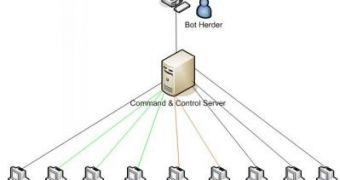Colonel Charles Williamson III wrote an interesting piece published in the Armed Forces Journal, admitting to the fact that a potential botnet designed especially to protect the United States of America computers would be extremely useful for the nation, because it would help reject attacks launched from any region of the world. As you know, botnets are usually used by spammers or hackers to infect or spread an infection over the world, as well as send tons of unsolicited email messages while remaining anonymous.
Obviously, in case the US Army created a botnet, such a malicious purpose does not come into discussion. "The U.S. would not, and need not, infect unwitting computers as zombies. We can build enough power over time from our own resources," the colonel wrote.
"America faces increasingly sophisticated threats against its military and civilian cyberspace. At the same time, America has no credible deterrent, and our adversaries prove it every day by attacking everywhere. Worse, our defensive concept is fundamentally flawed, and we have not learned the simplest lessons of history," he explained the reasons for which the United States needed a botnet.
"America needs a network that can project power by building an af.mil robot network (botnet) that can direct such massive amounts of traffic to target computers that they can no longer communicate and become no more useful to our adversaries than hunks of metal and plastic. America needs the ability to carpet bomb in cyberspace to create the deterrent we lack."
Botnets could indeed be useful for the United States but setting up such a network could raise lots of problems if the other countries do not agree with the US plans. "The biggest challenge will be political. How does the U.S. explain to its best friends that we had to shut down their computers? The best remedy for this is prevention. The U.S. and its allies need to engage in a robust joint endeavor to improve net defense and intelligence to minimize this risk," the colonel explains.
For the full article published by the Armed Forces Journal and signed by Colonel Charles Williamson III, check out this link.

 14 DAY TRIAL //
14 DAY TRIAL //